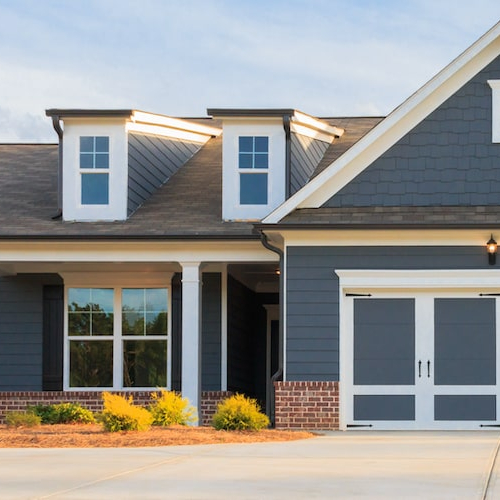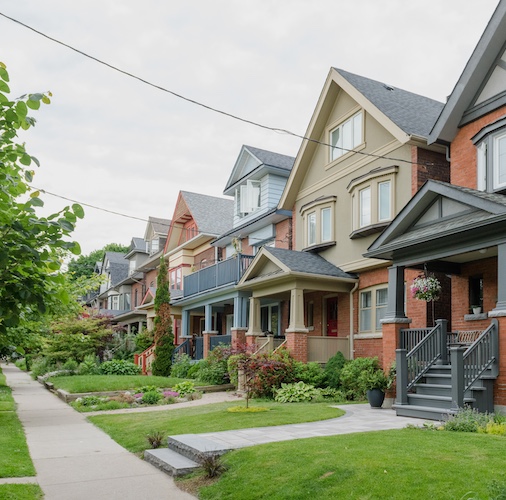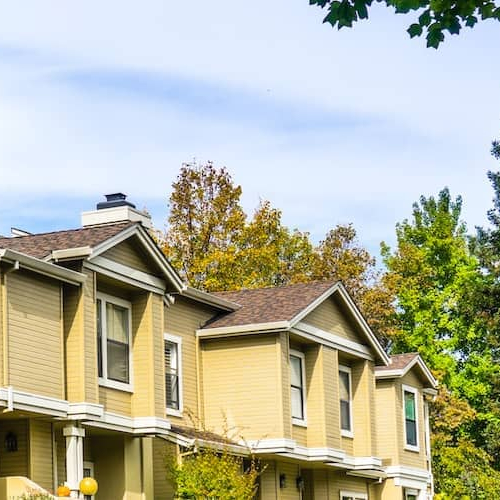20 popular types of houses and home styles
Feb 17, 2025
•12-minute read

When looking for a home, you'll have plenty of options. In addition to price and location, you can search for different home styles and types.
Maybe you've dreamed of living in a Victorian. Or maybe you're an empty nester who wants the single-floor layout of a ranch home.
Maybe you’re ready to ditch the maintenance that comes with a single-family home and you’re on the hunt for a condo or apartment unit. Or maybe you're going the other way, moving up from a rental to your first single-family residence.
What type of home are you looking for? It's important to know the terminology of house styles and types. Knowing this can help your real estate agent target the perfect home for you.
With that in mind, here is a look at 20 of the more popular home types and styles from which you can choose when searching for your ideal home.
Types of houses: Structures
It doesn't matter if you’re buying your first home, the home you plan to live in forever or a rental property, you need to first determine what type of home structure you want.
This often means deciding between an apartment, condo, co-op, single-family residence, or townhome. Each home type comes with pros and cons. Knowing them can help you decide which is best for you.
1. Apartment
An apartment is a residence that you rent within a larger building or complex. You'll live in your unit while sharing common areas with your fellow building residents.
Apartment buildings often feature common-area amenities such as on-site gyms, pools, community rooms, and laundry facilities. On the negative side, because you’re paying rent to a landlord, you don't build equity over time while living in an apartment.
Equity is the difference between what a home is worth and how much you owe on its mortgage. If you owe $200,000 and your home is worth $350,000, you have $150,000 of equity. The more equity you have, the more money you'll walk away with after selling a home. You can also borrow against equity in the form of home equity loans.
Here are the other pros and cons of apartment living:
Pros
- You'll spend less to move into an apartment than you will to buy a home.
- Your landlord will take care of repairs.
- Your landlord will handle maintenance such as mowing the lawn or shoveling snow.
- It's easier to move at the end of your lease.
Cons
- You don't build equity or wealth when renting.
- Your landlord might limit how you can decorate or personalize your space.
- Because you are living in a building with other residents, you'll have less privacy.
- Noise can be a concern.
2. Condo
A condo combines the convenience of renting an apartment with the financial benefit of building equity that comes with a single-family home.
While a condo is typically a single unit within a larger building, you own that unit. This means that you can build equity over time as you pay down your mortgage and the value of your condo unit rises.
Condos are good choices for seniors who want the benefits of homeownership without having to take care of a larger single-family home. They’re also a good choice for buyers interested in urban living.
Most condos are governed by a homeowners association (HOA) that cares for the building's common areas. This includes hiring professionals to take care of cleaning, maintenance, snow removal, and mowing. To help cover the expenses of this, every unit owner pays a monthly HOA fee.
You'll be responsible for paying for any repairs or renovations made to your individual unit.
Pros
- Condos require less upkeep than single-family homes.
- You can build equity while owning a condo.
- You might have access to community amenities such as a pool or on-site fitness center.
- The property's homeowners association will usually handle exterior maintenance.
Cons
- You'll need to pay a monthly homeowners association fee.
- You’ll typically have less space than in a single-family home.
- You are responsible for repairs and maintenance inside your unit.
- You'll have to follow the rules of your homeowners association.
3. Co-op
Also known as a housing cooperative, a co-op is a type of shared housing property. When you buy into a co-op, you are purchasing a share of whatever company owns the building in which your co-op unit sits. You are not buying the actual property in which you live.
Once the rest of the co-op members accept your offer to buy shares, you'll move in and gain a vote on how common spaces are maintained. You'll also split the costs of maintenance, repairs, and other fees with your fellow co-op members.
Pros
- When buying into a co-op, you are becoming part of a larger community.
- Co-ops are typically less expensive than single-family homes or condos.
- You'll get a say in how your housing co-op is run.
Cons
- You'll need to earn approval for any changes you want to make to your property.
- You might be charged higher monthly fees to cover expenses like utilities and parking.
- A smaller number of buyers are interested in co-ops, meaning it might be more difficult to sell a unit.
- Rocket Mortgage® only offers co-op loans in the state of New York and only offers these loans in areas in which co-ops are common.
4. Single-family home (detached)
A single-family home is what most people think of when it's time to buy a home. These are residences that are detached from any other housing unit, which sets them apart from apartments, condos, or townhomes.
A 2024 survey from the National Association of Home Builders found that 66% of buyers prefer single-family detached homes.
Single-family homes are most common in suburban areas and in the neighborhoods surrounding the downtowns or urban cores of cities. Single-family homes typically offer more privacy. Owners can also personalize or renovate their single-family homes without having to first get the approval of a homeowners association, unless they live in a housing subdivision governed by such an association.
Pros
- Single-family homes generally come with more space than other housing types.
- Over time, single-family homes have tended to increase in value.
- You'll have more freedom to personalize your home.
- Single-family homes come with more privacy.
Cons
- You are responsible for maintenance.
- Single-family homes are usually more expensive than other housing types.
- If you take out a mortgage, you'll need to come up with a down payment.
- You'll also pay for closing costs when you take out a mortgage.
5. Tiny homes
As the name suggests, a tiny home is a smaller version of a single-family home. Their sizes vary, but most tiny homes range from 60 to 600 square feet. Some are prefabricated, while others are built on a custom-order basis.
Owners seeking a simpler lifestyle with fewer possessions might choose a tiny home. These homes are often mobile, too, giving owners more freedom to move to new locations.
Pros
Tiny homes are usually more affordable.
Because they are often mobile, tiny homes provide more freedom.
A good option for people seeking a simpler lifestyle.
Cons
Tiny homes, as their names suggest, come with less space.
These homes are often a good fit only for single residents.
Tiny homes might come with a lower resale value.
You might have to rent or purchase the land on which your tiny home sits.
Getting a mortgage for a tiny home can be challenging. Rocket Mortgage does not offer loans for tiny homes, but Rocket can help you work through your tiny home financing options.
6. Townhomes
A townhouse or townhome is like a single-family home, only it shares at least one wall with another unit. You will, though, have your own entrance to your townhome unit. There is no common-area lobby like you'd find with apartment units or condos.
Townhomes typically offer more vertical space and come with several stories. They don't take up as much horizontal space because they butt up against other homes. Because of this, townhomes are popular in denser, urban areas. Many townhomes offer shared common space, such as a backyard.
Pros
- Townhomes typically cost less than single-family homes.
- A homeowners association might cover the hiring of landscapers, snow removal services, and other maintenance providers.
- You might have access to shared amenities.
Cons
- Townhomes offer less privacy because of the shared wall.
- You'll have less freedom to change your home's exterior.
- Some townhomes offer less living space than single-family homes.
Types of houses: Architectural styles
Once you decide on a property type, it’s time to find the right architectural style.
Whether you want a Cape Cod or a colonial or you’ve long dreamed of renovating an old Victorian, you’ll have plenty of choices when it comes to home styles. It all comes down to personal preference.
But as with all homes, different styles of residences come with their own pluses and minuses. Here is a list of some of the more common architectural styles of homes and their usual features. Knowing this information can help you ask the right questions during the final walk-through before you buy your new home.
7. Cape Cod
The Cape Cod home style traces its origins to the 1700s and its namesake city in Massachusetts. These homes are known for their resilience, built to handle the harsh New England winters. But they are also charming and quaint.
Traditional Cape Cod homes feature a central door flanked by windows, wooden siding and shingled roofs. Modern Cape Cods typically don't abandon these features but do add extra space and windows to meet the needs of today's buyers.
Key Features
- Shingles
- Wood siding
- A central door with windows along its sides
8. Colonial
Colonial homes also have a long history in the United States, dating back to the 1600s. They share several traits with Cape Cod homes, featuring a simple rectangular and symmetrical structure.
There is some variety in this style, though, depending on the specific type of colonial. They might be slight, but there are differences between the English, Dutch, Georgian, and Spanish style of colonial.
Colonial homes are usually at least two stories and feature both a large central staircase and a grand entryway.
Key Features
- At least two stories
- Symmetrical
- Central stairway
- A formal look
9. Contemporary
Yes, there is a difference between the contemporary and modern home styles. The term "contemporary" refers to homes built in the present day. The term "modern" refers to a period that has already passed, such as the Midcentury Modern home style.
A contemporary home often combines a modernist style, with an emphasis on open spaces and clean lines, with environmentally friendly building materials, natural textiles and walls that are painted in neutral colors featuring splashes of brighter color.
Key features
- Clean, simple lines
- Mostly neutral colors
- Natural textures
10. Federal
While federal style homes include several features also present in colonial residences, they boast enough unique features to stand apart. That's because federal homes are heavily influenced by Greek and Roman architecture. Federal homes are square or rectangular in shape and have distinctive Palladium windows and columns.
A good reference point for the federal style? Look at a picture of the Oval Office in the White House. That's a prime example.
Key features
- Brick exterior
- Ornamental features
- Fanlight doors
11. Craftsman
If you want a home that doesn't look like it was mass-produced in a factory? The Craftsman style might be a good fit.
This home style focuses on the value of handmade, well-constructed architecture. There is no cookie-cutter look with these home types.
Craftsman homes are usually built in a horizontal style. They often feature exposed wooden beams, low-pitched gable roofs and tapered columns decorating their front porches. The interiors of these homes often include personal touches such as built-in bookshelves and hand-crafted fireplaces.
Key features
- Hand-crafted wooden features
- Exposed beams
- Large columns
12. Greek Revival
It's easy to spot a Greek revival home. It's the one with stately columns that mimic those on the Parthenon and other famed Greek or Roman buildings.
This style of home, inspired by Greek philosophy and culture, first began appearing in the United States in the 1830s. In addition to their large columns, these homes feature white or subdued colors and grand front doors and entrances.
Key features
- Large white columns
- Greek-style enhancements
- Grand entrances and front doorways
13. Farmhouse
Looking for a rustic feel? A farmhouse home might be the right choice for you.
As the name suggests, these homes are inspired by the homes you might see when driving past a farm. They often feature tall ceilings, exposed wooden beams, large front porches and a rectangular layout. Many come with a central fireplace.
Some farmhouse properties come with barn-shaped roofs, while others are more subtle about their connection to farm living. Modern farmhouse styles keep the rustic look but also combine it with clean lines, layouts that are more open and other updated features.
Key features
- Rustic
- Rectangular floor plan
- Large porches
- Barn-shaped roofs and barn-inspired features
14. French country
If you've ever fantasized about living in the rural countryside of France, a French country-style home might be your ideal residence.
These homes are inspired by the residences common in the rural areas of France, locations such as Provence. They feature pointed roofs that are usually crafted from stone.
Inside, French country homes often come with stone fireplaces and distressed wood. Pastels and other subdued palettes make up the interior aesthetic of these properties.
Key features
- Provencal influences
- Stone exterior
- Weathered look
15. Mediterranean
Want to feel as if you are living in a villa in Italy or Spain? You might consider hunting for a Mediterranean-style home.
These homes incorporate housing elements from Spain and Italy. A key feature is a focus on indoor-outdoor living. Because of this, these homes are most popular in states with warmer weather such as Florida and California.
What features might you find in Mediterranean homes? Think tiled roofs, warm stone, soft wood, and white stucco walls. These homes often include intricate metal work on their windows and balconies.
Key features
- White stucco walls
- Wood and stone in warm hues
- Tiled roofs
16. Midcentury modern
Midcentury modern homes are all about functionality. This style, which hit the United States after World War II and traces its roots to the Bauhaus movement, says that while art can be beautiful, it should not come at the expense of a livable, functional home.
Midcentury modern homes feature sleek and uncluttered designs. They come with large windows designed to connect these residences to nature. These homes are built from a combination of natural and man-made materials.
Key features
- Mix of organic and geometric
- Sleek and uncluttered interiors
- Large windows
17. Ranch
The popularity of ranch homes boomed in the 1950s. These are often good choices for homeowners who no longer want to walk up and down stairs as most ranch homes sit on one story.
These homes feature low-pitched roofs, large windows, big backyards, open living spaces, attached garages and sliding glass doors.
What's most interesting about ranch homes is that they come in such a variety of styles, such as split-level, California, storybook and raised ranch. California-style ranch homes, for instance, are shaped like an "L" or a "U." They often feature large backyards, designed to encourage residents to spend more time outside.
Key features
- Single story
- Open floor plans
- Large backyards
- Low-pitched roofs
18. Split-level
You can consider split-level homes to be a subset of the ranch home. These homes, which grew in popularity during the 1950s and '60s, feature multiple floors connected with short flights of stairs.
That's the difference between split-level homes and traditional two- or three-story homes that separate their floors with longer flights of stairs.
These homes have fans, those who enjoy the unique way the different levels are separated. Others, though, find the many short flights of stairs that dot these homes to be a nuisance.
Key features
- Living spaces separated by short flights of stairs
- Low-pitched roofs
- Attached garages
19. Tudor
Tudor homes are known for their late Medieval and early Renaissance architectural elements. This includes stone masonry, timber framing, gable roofs and classic leaded windows.
Tudor homes are usually asymmetrical. When you look at one, it might remind you of the homes you've seen in children's storybooks.
You can thank the European-trained architects of the late 1800s for bringing this style to the United States.
Key features
- Timber framing
- Plentiful stonework
- Asymmetrical design
- Steep gable roofs
20. Victorian
Victorian homes are named after Queen Victoria and emerged in the United States in the 1830s. These distinctive homes typically stretch for two to three stories and include a host of ornate decor.
Victorian homes are known, too, for their large bay windows, small towers, large porches, and steep gable roofs. Then there are the colors: Victorian homes, often referred to as painted ladies, come in a variety of bright, playful colors.
Key features
- Two to three stories
- Steep gable roofs
- Bright exterior colors
- Small towers dotting their exteriors
- Ornate design
The bottom line
Which of the above homes ranks as your dream property? It's important to know this before you start searching for your new residence. Narrowing your housing search down to a few types of homes will make the search for a new home less overwhelming.
One other big step to take before starting your home search? You should get preapproved for a mortgage, so that you know exactly how much home you can afford to purchase.
You can start your mortgage application online with Rocket Mortgage today. That way, if you find your ideal home, you can quickly make an offer.

Dan Rafter
Dan Rafter has been writing about personal finance for more than 15 years. He's written for publications ranging from the Chicago Tribune and Washington Post to Wise Bread, RocketMortgage.com and RocketHQ.com.
Related Resources

8-minute read
Different types of mortgages and how they work
There is a home loan for everyone, but which type of mortgage is best for you? Use this article to understand the types of home loans and how they work.
Read more
9-minute read
Starter home or forever home: Which is right for you?
A starter home is a small, affordable home for first-time buyers. Find out if it makes sense to buy a starter home or if a forever home is right for you.
Read more

5-minute read
What is a multifamily home and is it right for you?
A multifamily home is a residential property with more than one housing unit. Learn everything about the ins and outs of multifamily real estate investments....
Read more